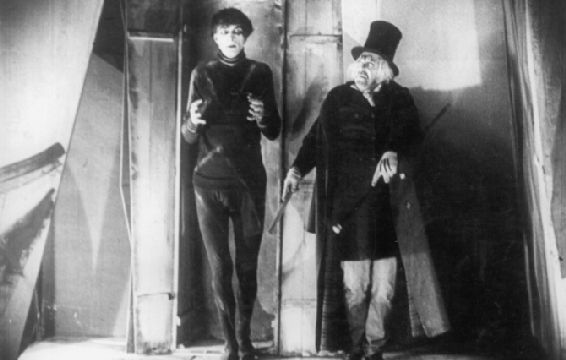The Cabinet of Dr. Caligari (1920) 
“You must become Caligari.”

Director: Robert Wiene
Cast: Werner Krauss, Conrad Veidt, Friedrich Feher
Synopsis: Dr. Caligari’s somnambulist, Cesare, and his deadly predictions.
WARNING – this review contains SPOILERS!
Caligari is the type of character to make parents of young children nervous. He’s a squat bug of a man, untidy and menacing, and he was played by Werner Krauss (Jew Suss), who was only 36-years-old at the time, although he looks much older. Caligari arrives in the town of Hostenwall and immediately has a run in with the officious town clerk over his application for a sideshow licence. He has a somnambulist named Cesare (Conrad Veidt — Casablanca) whom, he informs his patrons, has slept for 23 years, although he can be awoken at show-time by the good doctor to answer any questions posed by his curious public. The town clerk ends up murdered for his rudeness, as does Alan (Hans Heinrich von Twardovski – Casablanca), an impetuous young man whose question of Cesare — ‘When shall I die?’ — is met with the unequivocal response ‘before dawn tomorrow.’ Naturally, when Alan’s friend, Francis (Friedrich Feher) alerts the police to the uncanny accuracy of Cesare’s prediction, Caligari and his freaky sideshow attraction are placed high on the list of suspects. But as Alan keeps watch on Caligari and Cesare, his girlfriend, Jane (Lil Dagover — Harakiri) is abducted…
The story is preceded by a scene in which Alan sits on a bench talking to an older man. When Jane walks past in an apparent trance without acknowledging him, Alan informs his companion that she is his fiance, and the story of how she arrived at her present condition is a fantastic one. We have no reason to doubt him at first, but the back-drop of claustrophobically tilting angles and distorted perspectives against which his story unfolds gives us a clue into the skewed perceptions of its narrator. In fact, the production design of The Cabinet of Dr Caligari is so striking that it’s one of only a few films that benefits, rather than suffers, from a lack of sound. It would be nowhere near as effective if it was a talkie because it would lose the pervasive atmosphere of a low-key nightmare in which everything is familiar but different.
The famous twist is one of those plot devices which blows away the questions that were beginning to stack up before it was revealed. What is Cesare’s back-story? What is the doctor’s motive? How does he choose his victims? Is it because he dislikes them — or because he likes them? Or is it because they ask impetuous questions? His actions make no sense. But that’s the film’s greatest secret when watched for the first time. They’re not supposed to make sense, because they’re taking place in the mind of a madman.
(Reviewed 10th September 2014)
httpv://www.youtube.com/watch?v=IAtpxqajFak
